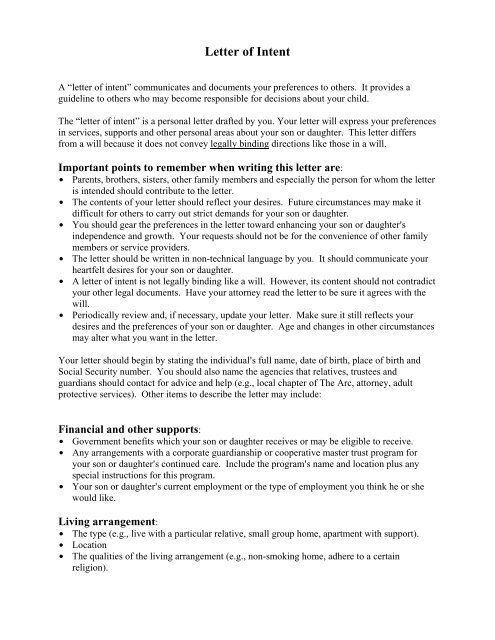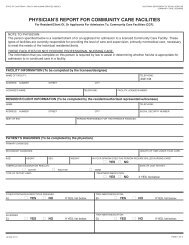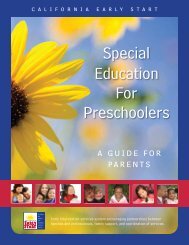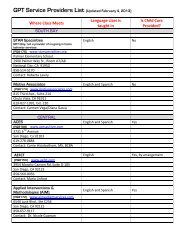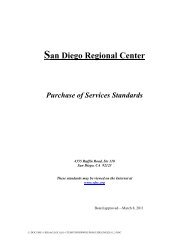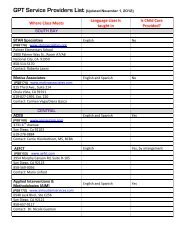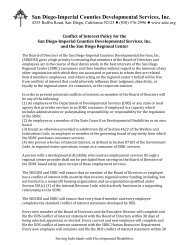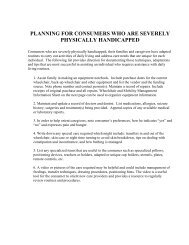Letter of Intent
Letter of Intent
Letter of Intent
Create successful ePaper yourself
Turn your PDF publications into a flip-book with our unique Google optimized e-Paper software.
<strong>Letter</strong> <strong>of</strong> <strong>Intent</strong>A “letter <strong>of</strong> intent” communicates and documents your preferences to others. It provides aguideline to others who may become responsible for decisions about your child.The “letter <strong>of</strong> intent” is a personal letter drafted by you. Your letter will express your preferencesin services, supports and other personal areas about your son or daughter. This letter differsfrom a will because it does not convey legally binding directions like those in a will.Important points to remember when writing this letter are:$ Parents, brothers, sisters, other family members and especially the person for whom the letteris intended should contribute to the letter.$ The contents <strong>of</strong> your letter should reflect your desires. Future circumstances may make itdifficult for others to carry out strict demands for your son or daughter.$ You should gear the preferences in the letter toward enhancing your son or daughter=sindependence and growth. Your requests should not be for the convenience <strong>of</strong> other familymembers or service providers.$ The letter should be written in non-technical language by you. It should communicate yourheartfelt desires for your son or daughter.$ A letter <strong>of</strong> intent is not legally binding like a will. However, its content should not contradictyour other legal documents. Have your attorney read the letter to be sure it agrees with thewill.$ Periodically review and, if necessary, update your letter. Make sure it still reflects yourdesires and the preferences <strong>of</strong> your son or daughter. Age and changes in other circumstancesmay alter what you want in the letter.Your letter should begin by stating the individual=s full name, date <strong>of</strong> birth, place <strong>of</strong> birth andSocial Security number. You should also name the agencies that relatives, trustees andguardians should contact for advice and help (e.g., local chapter <strong>of</strong> The Arc, attorney, adultprotective services). Other items to describe the letter may include:Financial and other supports:$ Government benefits which your son or daughter receives or may be eligible to receive.$ Any arrangements with a corporate guardianship or cooperative master trust program foryour son or daughter=s continued care. Include the program=s name and location plus anyspecial instructions for this program.$ Your son or daughter=s current employment or the type <strong>of</strong> employment you think he or shewould like.Living arrangement:$ The type (e.g., live with a particular relative, small group home, apartment with support).$ Location$ The qualities <strong>of</strong> the living arrangement (e.g., non-smoking home, adhere to a certainreligion).
Programs/services:$ The type <strong>of</strong> school or day program setting you think would best meet your son or daughter’sneeds.$ The type <strong>of</strong> services, therapies or medical interventions that are needed or may be needed(e.g., job training, speech therapy).$ Routine medical care (e.g., regular check-up, annual eye examination) and the names andlocations <strong>of</strong> preferred medical pr<strong>of</strong>essionals. Include any health insurance that should bemaintained.$ Regular routines in the person=s schedule (e.g., daily schedule <strong>of</strong> getting ready for school,weekly appointments).Personal preferences:$ Grooming and hygiene preferences (e.g., type <strong>of</strong> clothes, hair style, preferred toilet articles).$ Likes and dislikes about food, chores and other areas.$ Favorite personal items (e.g., personal radio, certain furniture).$ Personal habits important for someone else to know about.$ Friends and close relatives, their locations and how <strong>of</strong>ten your son or daughter likes to visitthose people.$ Favorite recreation and other leisure activities and your son or daughter=s level <strong>of</strong>independence in these activities. Include how <strong>of</strong>ten he/she likes to participate in activities.Abilities:$ Level <strong>of</strong> independence in getting around the community (e.g., can take public transportation,independence in shopping).$ Abilities in handling money (e.g., change-making, independence in purchasing items).$ Abilities in reading, writing, communicating and understanding what others may tell him orher. If your child does not use verbal communications, how he or she communicates desiresor replies to others.List any other information that is important for your son or daughter. Both parents should signthe letter. After having your attorney review the letter, keep a copy for yourself and a copy withyour legal will. Distribute the letter to those who may be responsible for decisions about yourchild.This information was excerpted from AA Family Handbook on Future Planning@, Sharon Davis, Ph.D., Editor, theARC <strong>of</strong> the United States and the Rehabilitation Research & Training Center on Aging & DevelopmentalDisabilities, Dept. <strong>of</strong> Disabilities and Human Development, College <strong>of</strong> Applied Health Science, University <strong>of</strong>Illinois at Chicago, Dec., 2003. See http://www.thearc.org


